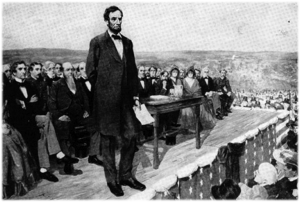What Does a Good Presidential Candidate Look Like?
Think back to the last election season, the presidential candidates, and the years that transpired since then. Then, think back to what you remember in history class, and when you wrote those papers in high school about the early founders and leaders of this great nation.
Do you see the similarities? …Neither do I.
Every election season, we as a nation go through our “religious” and “rigorous” selection process to decide who will be the next leader of the free world. But here is the thing that doesn’t really make sense: what “criteria”that we are using to select a president actually applies to what matters in a president?
Think about it this way: What are the key things we focus on? Their economic plan to “save the day”? Their nifty solution to our foreign policy woes? What celebrity show they are guest appearing on? – How do any of those qualities really apply to what a president does and needs to do day-to-day?
There are about 300 million people living in the USA today according to census.gov. We also have a 17.6 trillion dollar debt according to usdebtclock.org. In addition, we have about 22,000 federal employees to manage and tend to according to forbes.com.
What are the odds that a single man is able to come through and solve all of our problems all while keeping the country running? More importantly, is that even his job?
If you asked the founding fathers, they would most assuredly say that it isn’t. So let’s say that they knew a thing or two, and let’s entertain what then the president’s job description might look like according to what the founding fathers had conceived. What Does a Good Presidential Candidate Look Like?
A New Old President
Yes, I know, I am going to get immediately slapped with the title of “libertarian” by bringing in the constitution – but bear with me for just a second and let’s see if we can simplify this long and wordy section of Article. II.of the constitution:
Section. 2.
The President shall be Commander in Chief of the Army and Navy of the United States, and of the Militia of the several States, when called into the actual Service of the United States; he may require the Opinion, in writing, of the principal Officer in each of the executive Departments, upon any Subject relating to the Duties of their respective Offices, and he shall have Power to grant Reprieves and Pardons for [Offenses] against the United States, except in Cases of Impeachment.
He shall have Power, by and with the Advice and Consent of the Senate, to make Treaties, provided two thirds of the Senators present concur; and he shall nominate, and by and with the Advice and Consent of the Senate, shall appoint Ambassadors, other public Ministers and Consuls, Judges of the supreme Court, and all other Officers of the United States, whose Appointments are not herein otherwise provided for, and which shall be established by Law: but the Congress may by Law vest the Appointment of such inferior Officers, as they think proper, in the President alone, in the Courts of Law, or in the Heads of Departments.
The President shall have Power to fill up all Vacancies that may happen during the Recess of the Senate, by granting Commissions which shall expire at the End of their next Session.
Section. 3.
He shall from time to time give to the Congress Information of the State of the Union, and recommend to their Consideration such Measures as he shall judge necessary and expedient; he may, on extraordinary Occasions, convene both Houses, or either of them, and in Case of Disagreement between them, with Respect to the Time of Adjournment, he may adjourn them to such Time as he shall think proper; he shall receive Ambassadors and other public Ministers; he shall take Care that the Laws be faithfully executed, and shall Commission all the Officers of the United States.
If we re-wrote that as simply as we could, perhaps it would read:
- The president is in charge of the military – the highest general.
- He is in charge of foreign policy; treaties and foreign relations.
- He is to communicate with the people.
- He is to bring the political parties and branches of the government together.
That’s not so complicated to grasp, is it?
But what does that look like on a political campaign, or more importantly, on a day-to-day basis for a president? What does that kind of president look like?
A Model Presidential Candidate
If one could draw a picture of who that person might be, perhaps it would be this:
- The person must be a man of true honesty & humility.
- Must be able to truly lead people well – a true leader.
- Must be able to communicate clearly.
All of these characteristics matter greatly, and are likely the cornerstone pieces needed for a truly great president – but what would that look like in a political campaign?
Getting Honest and Humble
 Perhaps the first thing one might look for in a presidential candidate, a true public servant and leader, is that they state publicly all the wrongdoings that they have done, repented of, and turned away from – and then put it clearly on their campaign website? This would show a true desire to be honest, humble, and would also show great courage – this is likely the most difficult first step one could take.
Perhaps the first thing one might look for in a presidential candidate, a true public servant and leader, is that they state publicly all the wrongdoings that they have done, repented of, and turned away from – and then put it clearly on their campaign website? This would show a true desire to be honest, humble, and would also show great courage – this is likely the most difficult first step one could take.
However, like most other times, doing the right thing, although difficult, nearly always leads to a better outcome. Think about this: if a candidate has already stated their wrongdoings, how can there be a scandal if everyone already knows what they did? How can someone throw dirt in your face if you have already admitted to your sin, and publicly apologized for it?
Then, when something goes wrong, which it inevitably will – take responsibility for it as the leader, find out what needs done differently, apologize, and then move on. There will always be people nagging, but 99% of people will be so shocked that you just admitted it, that they will likely forget all about what you did!
Leading Well
Every year we have these silly presidential debates where we publicly quiz each candidate on extremely complicated and detailed issues, and then give them 30 seconds to respond on a topic that I quite frankly don’t care whether they know anything about.
No person knows everything on foreign policy, economics, military strategy, education, energy, transportation, accounting, and now healthcare. Seriously? You think that anyone is an expert on ALL of those fronts? And the you expect some simple answer on the issues in the middle east?
 So why try to be all that? Why not simply state along with your nomination and acceptance, who (or whom) you will be relying on for decisions on these matters instead of trying to pretend like you know about things that you really don’t?
So why try to be all that? Why not simply state along with your nomination and acceptance, who (or whom) you will be relying on for decisions on these matters instead of trying to pretend like you know about things that you really don’t?
What about this: what if for each topic, the candidate put together three people, a trio, for each topic, and then simply conferred with them on any particular issue? Perhaps make one member a political/lawyer that knows the details and logistics, one as a mildly to completely unknown expert in a given area, and then one that may not know much about the issue, but that you would trust completely by their character and honesty.
Then, when asked for specifics by reporters or journalists that had not yet been discussed by your trio, simply reply, “I do not know, but I know three people who are experts in this area and I would be happy to discuss it with them on my next available meeting with them.”
You could then provide a place to send questions on your website that would either be immediately answered, if previously answered, or would get sent to the proper trio first for them to discuss.
My point is this: a president does not need to know everything – they need to be able to lead well. This means showing that they can find, organize, and work with – in a helpful way – these groups of people. This would show me at the start that they could handle working with the various branches of government.
This is also the starting point to beginning the process of uniting a very divided American people.
Communicating Clearly
![FDR-Fireside Chat_thumb[2]](http://www.ourlittle.farm/wp-content/uploads/2014/07/FDR-Fireside-Chat_thumb2-300x243.jpg) Do you remember fireside chats? If you are as young as I am, you probably don’t, but you may have read or heard about them in history class. For the people of that time, these broadcasts were wildly helpful to the people of that time.
Do you remember fireside chats? If you are as young as I am, you probably don’t, but you may have read or heard about them in history class. For the people of that time, these broadcasts were wildly helpful to the people of that time.
Even though in many cases, he was in a small and uncomfortable room when making these broadcasts, the point of these broadcasts were not loud and emotionally charged, they were not wordy or full of jargon. No, they were made for simple people, using simple words, with the scene set as a grandfather talking to his children and grandchildren about difficult issues as caring and helpfully as possible. Want to hear one? Check one out at the millercenter.org
So how would that work today? Perhaps one could simply create a website/twitter feed/google hangout, and one a month, or even twice a month, open up a public stream to whoever is interested and just talk to the people. Talk about what’s going on, what you have done since the last chat, etc. just talk to people and let them know that you are human, that you are working every day, and that things are changing and going to get better.
None of these things are “simple” but they are all possible. Washington did it.
It’s time to stop complaining; what are you looking for in a president? It’s time we started looking.





